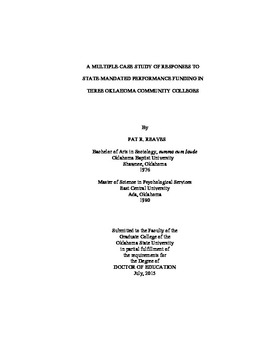| dc.contributor.advisor | Wanger, Stephen P. | |
| dc.contributor.author | Reaves, Patricia R. | |
| dc.date.accessioned | 2016-09-29T18:42:37Z | |
| dc.date.available | 2016-09-29T18:42:37Z | |
| dc.date.issued | 2015-07 | |
| dc.identifier.uri | https://hdl.handle.net/11244/45306 | |
| dc.description.abstract | In April 2012 the Oklahoma State Regents for Higher Education revised the funding formula for public higher education institutions to include a performance funding component. Although performance funding is widely implemented by states as a mechanism for promoting increased production of degrees by public colleges and universities, the research literature suggests that performance funding is largely ineffective as a mechanism for increasing the number of degrees granted. In states with performance funding policies, higher education institutions made intermediate institutional changes in response to performance funding but those changes did not result in significant increases in the number of degrees awarded. Studies also raised concerns about unintended effects of performance funding that restrict admissions or reduce academic quality. This dissertation explored the responses of Oklahoma public community colleges to the implementation of formula-based performance funding, as perceived by community college mid-level administrators. This qualitative study utilized interviews with mid-level administrators and review of public documents and applies a complexity theory lens to explore responses to formula-based performance funding in three public community colleges. The study found that participants associated formula-based performance funding with demands for increased graduation numbers and Oklahoma public community colleges are responding to formula-based performance funding with efforts intended to increase retention and graduation of students. Subsequent to the implementation of formula-based performance funding, two of the colleges in the study adopted revised mission statements that emphasize degree completion. Although participants acknowledged the value of performance funding as an accountability mechanism, they expressed concern that performance-funding could contribute to changes that might lower academic quality and restrict the community college mission. Recommendations for further research and implications for practice to protect academic quality and mission of the community college are presented. | |
| dc.format | application/pdf | |
| dc.language | en_US | |
| dc.rights | Copyright is held by the author who has granted the Oklahoma State University Library the non-exclusive right to share this material in its institutional repository. Contact Digital Library Services at lib-dls@okstate.edu or 405-744-9161 for the permission policy on the use, reproduction or distribution of this material. | |
| dc.title | Multiple-case study of responses to state-mandated performance funding in three Oklahoma community colleges | |
| dc.contributor.committeeMember | Kearney, Kerri S. | |
| dc.contributor.committeeMember | Mendez, Jesse Perez | |
| dc.contributor.committeeMember | Fry, Pamela Martin | |
| osu.filename | Reaves_okstate_0664D_14077.pdf | |
| osu.accesstype | Open Access | |
| dc.type.genre | Dissertation | |
| dc.type.material | Text | |
| thesis.degree.discipline | Higher Education | |
| thesis.degree.grantor | Oklahoma State University | |
